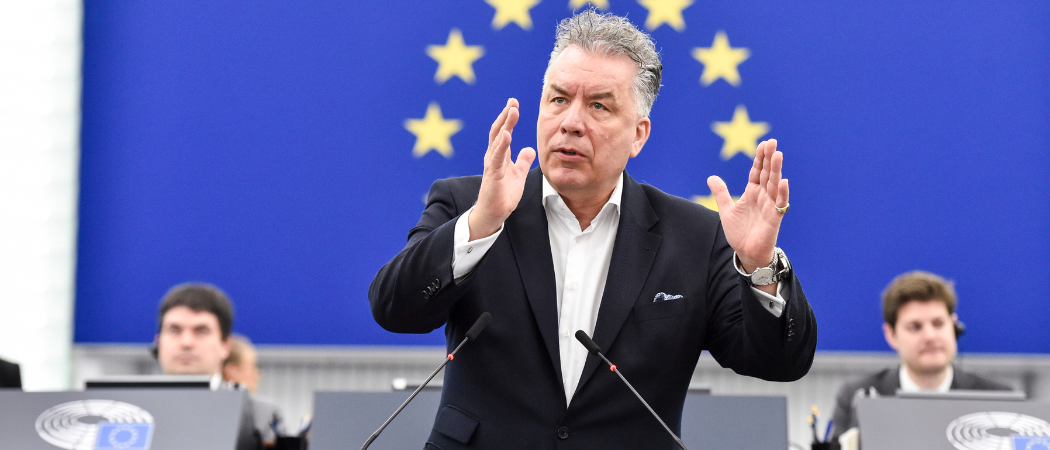Christian Ehler MEP says the next research programme should be less prescriptive, creating space for serendipity and bottom-up ideas

MEP Christian Ehler. Photo credits: Eric Vidal / European Union
Europe needs a stronger science, research and innovation policy to safeguard our prosperity and our strategic autonomy, and to deliver on our objective of climate-neutrality by 2050.
Both French president Emmanuel Macron and former Italian prime minister Enrico Letta recognised this recently, and we all know they are right. President Macron called for Horizon Europe to be strengthened, by putting the focus on the most effective parts of the research programme, such as the European Research Council (ERC).
If research is truly going to deliver European prosperity – on which, as Macron also pointed out, our productivity and competitiveness depend – what are the lessons we can learn from Horizon Europe for its successor, Framework Programme 10?
This is of course the key question for Manuel Heitor and his team of experts appointed by the Commission to provide advice on the design of FP10. But I already have one conclusion: the framework programme cannot simply follow political priorities. At its core, FP10 must be about research and innovation, and not about other policy priorities.
Horizon Europe, far more than its predecessors, is aligned with policy priorities, but that has increased the complexity of the programme. This is something that we as co-legislators decided. We introduced new elements, like the Strategic Plan and the Missions, to align the programme with policy priorities which led to an increased number of instruments and programming processes.
Another crucial aspect contributing to increased complexity was the implementation choices, with the Commission clearly favouring radical ‘co-creation’ for the programming of Horizon Europe. The Strategic Plan is the result of very extensive interservice collaboration, while the Missions are run by steering boards made up of leaders and experts from several directorates.
Work programmes are no longer developed with a clear lead directorate general, but rather follow a consensus approach. This move to co-creation comes on top of the decentralisation – which started a few years back – of the management of framework programme projects, which moved from the research directorate to the Commission’s executive agencies.
This approach completely underestimates the importance of officials in charge of programming having a good understanding of the functioning of a particular research field. Understanding the needs stemming from our policy priorities is somewhat different to understanding how a particular research field can contribute to this, understanding the process of moving from a proof of concept to scaled up deployment in a specific sector or field of application. At one time the Commission’s directorate general for research and innovation acted as bridge between policy priorities and scientific developments. Now it seems to have abdicated this role - or at least seems less able to fulfil it.
This has all resulted in Horizon programming now being subordinated to the politics of the moment. The Joint Undertakings and other public-private partnerships were all structured to deliver outputs that would contribute to the 2030 targets of the EU, meaning that these investments were shifted to higher technology readiness levels (TRLs).
The Missions were set up to deliver concrete, tangible results by the end of this decade as well – pushing the TRLs even higher. And, for the first time, there is consensus among research stakeholders that Horizon Europe has focused too much on high TRLs during the first four years of the programme.
Killing flexibility
But my point is not about TRLs as such, but about how increasingly prescriptive we are in the implementation of our research programme. The more we focus it on current policy objectives and the more Horizon Europe has an implementation budget shared by all directorates, the more prescriptive we get. This kills flexibility – even to the extent that the Commission is willing to push ahead with work programmes that do not get the support of the programme committee - as was the case for the 2023 - 2024 civil security cluster.
This demonstrates that there is fundamental misunderstanding of the power of public funding of research, which should be the means to create a better world for all. It clearly cannot do this by prescribing what the world must look like. The power of research funding lies in its ability to bring together the best minds in the world to come up with ideas and solve problems in ways we never thought of - or indeed to solve problems we did not even realise we had.
This is not to say there should be no direction or stated objectives. Rather it is to say that Horizon Europe was too focused, leaving less room for serendipity. FP10 should create more space for creativity and bottom-up ideas.
This is a particularly important lesson if we go back to the message of Macron and Letta - that research lays the foundations for our prosperity, strategic autonomy and decarbonisation. This was also the fundamental and basic argument for involving Horizon Europe in the Strategic Technologies for Europe Platform (STEP).
STEP centralised technology choices at the highest level of budgetary policy. While STEP was designed as a temporary, targeted effort – which we needed at that moment – it seems to have set the philosophical tone in the Commission. This is a philosophy that overemphasises predictability and control. It is an approach that denies the best thing researchers have to offer us as policy makers: inventing new solutions that we could not have foreseen in our policy making.
The recognition of Macron and Letta of the importance of research and innovation for the future of Europe is extremely welcome. We need high level political support to ensure our R&I investments double under the next seven year EU budget.
At the same time, FP10 must remain independent and not just be a conduit to implement policy priorities. It should fund transformative ideas, not predetermined technological outcomes. Because R&I is too important to be left to policy makers – even if they are visionaries like Macron and Letta.





 A unique international forum for public research organisations and companies to connect their external engagement with strategic interests around their R&D system.
A unique international forum for public research organisations and companies to connect their external engagement with strategic interests around their R&D system.